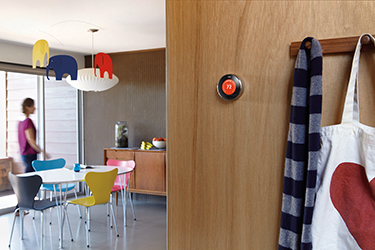|
Subscribe / Renew |
|
|
Contact Us |
|
| ► Subscribe to our Free Weekly Newsletter | |
| home | Welcome, sign in or click here to subscribe. | login |
Real Estate: Crib Notes by Joe Nabbefeld
| |

By Joe Nabbefeld |
February 19, 2015
Crib Notes: Keys are so last year! Let's get ready for homes we can run with our phones
Special to the Journal
Who in their right mind wants more digital tech in the home?
Well, Millennials for one... if you could label them “in their right mind.” And digital tech billionaire wannabes who wanna sell you that stuff. With a 6-month shelf life/replacement rate, eh?
This column is going to delve into that stuff, but let's just say we're starting from a place of strong skepticism, of don't-consume-just-to-consume. And a place of “don't be so sure your ‘eco-green' is greener than the old ‘green.'” (As Michelle Shocked sang: “Everything's greener on the greener side.”) With as much delicious sarcasm as we can spread on the bread.
Disclosure: Your writer is safely, happily tagged a digital dinosaur. The sort who says “you're not going to fool me with your gadgets and your endless, soulless social websites.”
Your writer has not had a TV in the home, oh so proudly, for more than five years. But here's why (don't tell anyone): the wifi and the iPad provide more entertainment than a TV ever could (it's AMAzing!).
So we're seated on a couch in the home typing on this iPad, which auto-saves to the iCloud. Pandora is playing from the pad, and the smartphone right over there.
Nevermind where all the electricity will come from. And where all this toxic e-junk goes after each 6-month buy-the-newest cycle.
Newspapering isn't about saving a punchline for the end, either. Got to pack it up top. So my conclusion will be:
Some of this stuff is brilliant. It's about creating choice and it's coming fast. It'll keep improving and costs will drop. And the best of it will truly save energy for the planet, and increase our safety from fires, intruders, carbon monoxide, accidents and natural disasters.
The quicker one can get a fire put out, well, that's an eco, safety and wallet gain, eh?
Let's start with Nest. That's a company with the newest “better mousetrap” to sell. In Nest's case, it's a thermostat. Yep, the program-with-your-smartphone version. Nest has a “better, smarter” smoke detector and carbon monoxide detector, and a lovely website. And next: a smart e-car charging station that can tell you when electricity costs are high (daily peak usage times) and when they are low so you can charge your vehicle during the cheapest hours.
Do we really need a better thermostat?
Well, if it costs $249 and is supposedly easy to install, and then it saves you $173 per year on your heating bill (and cooling bill if you live somewhere else), then the math says it paid for itself in about 1.5 years. That's at today's energy prices.
Nest claims on that splashy website that smart use of their gorgeously designed thermostat shaves about 20 percent off your home energy use per year. If your home heating bill averages an already-low $80 per month, or $1,000 per year, 20 percent is $200. Jives closely enough with Nest's number.
That's like getting paid to help our planet, which some folk try to do at no pay.
Nevermind the other benefits for that $250, such as your thermostat discerning after weeks of use what your habits are, and then automatically warming and cooling the house at just the right time (and creating that energy savings by doing so).
Your thermostat also can tell you when the furnace filter needs changing — in a Siri-type voice, of course. A dirty filter can add 5 percent to your energy bill, according to that splashy website. And it shortens the life of that furnace by making it labor, according to Crib Notes' furnace repair person.
We don't need more furnaces in the landfill now do we?
Let's jump to the smoke and CO detector, called Nest Protect. These little gizmos look gorgeous too, on the splashy website. And they talk, of course, in that voice. They also blink lights — as in ALL of the lights in your house — or flash red when the device detects a hazard.
The devices don't just talk to you when you're home, of course. They talk to your smartphone. Let's say your dog mid-day hops onto the counter searching for a snack and flicks on the stove, which ignites a newspaper. Your smartphone quickly tells you, miles away, and — if you programmed things right — has called the proper authorities for you.
The device can alert you — via smartphone — when it needs a new battery. (No more of that horrible beeping at 3 a.m.)
We have not tried any of this stuff. Count on it. But we have a friend who took the Nest plunge and says he truly is saving energy and money. He installed it himself, so that took a bit of acumen, but one can pay to have it installed. (Basically it appears you unhook your current thermostat and hook in the pretty Nest one, then go nutty with the programming).
This friend has a home in Seattle and one in California. He can run the dials on both homes from one smartphone anywhere, which he said helps amplify the energy savings and safety improvements.
We didn't ask what happens if you lose or drop the smartphone (go buy another one right away?). Nor did we ask which NSA department or other hacker can see all that personal data. For another day.
Here's one more whiz-bang Nest feature: You can add gizmos so that when you turn the key in the front door, the thermostat knows. It even knows which human turned the key and their preferences: 67 degrees in the study in the late afternoon and then 72 in the kitchen by 6.
That's a segue for a brief glance at home security. You know, cameras beaming to smartphones or office computer screens, maybe even running the criminal history of an intruder as they approach the back door; then teeing up a digital jury and having the intruder delivered to a jail cell by midnight.
AT&T has a jump on that one. They call it Digital Life.
“Keys are so last year!” the Digital Life website proclaims. “Set up unique entry codes for everyone in the house, or unlock the front door for someone even when you're not there to greet them. You can even open or close the garage door remotely.”
That includes turning off the ex-partner's entry code (via your smartphone) when they un-friend you on you know what.
Ok, back to the end: Some of this stuff is brilliant. It's about creating choice ...
Joe Nabbefeld is a Realtor with Windermere Capitol Hill. You can reach him at http://www.RealSolutions.biz. He was the DJC's commercial real estate editor back in the late 1990s and early 2000s.
Joe Nabbefeld is a Realtor with Windermere Capitol Hill. You can reach him at www.RealSolutions.biz. He was the DJC's commercial real estate editor back in the late 1990s and early 2000s.
Previous columns:
- Crib Notes: Bettin' money says buy now in Pioneer Square, 01-22-2015
- Crib Notes: What's up for 2015? Bertha will be digging tunnels and homebuyers will be digging technology, 12-18-2014
- Crib Notes: Apartment developers today delivering easy commutes, fun Saturday mornings, 11-13-2014
- Crib Notes: Small housing units are here to stay, 10-16-2014
- Crib Notes: Even NAR gets it — Go green at home, 09-18-2014
- Crib Notes: Live-work units work, so bring ‘em on everywhere ‘creatives' are gathering, 08-14-2014
- Crib Notes: Relax everybody. It's just a boom, 07-24-2014
- Crib Notes: Are rail stations boosting home prices? Data crunch for Beacon Hill says yes, 06-26-2014



